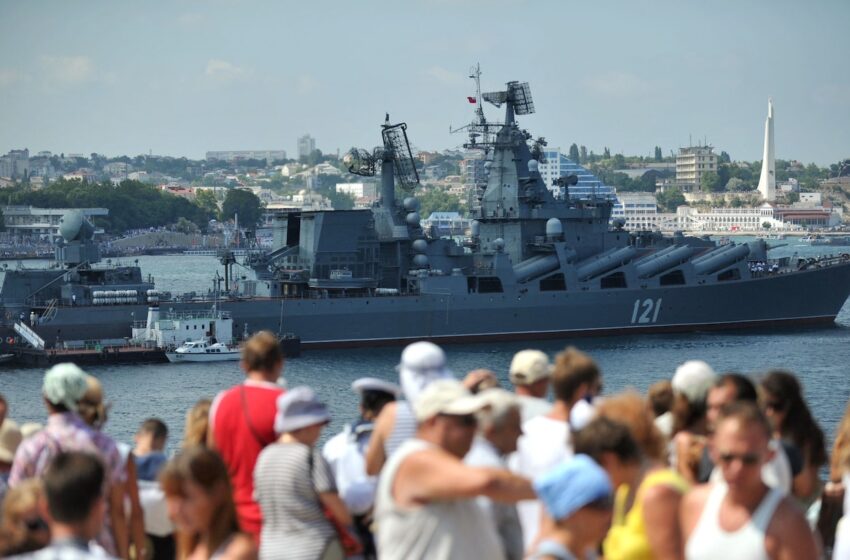
Pentagon: Russia flagship Moskva suffered ‘explosion’

The explosion occurred Wednesday about 70 to 75 miles from Odessa, a seaside hub in Ukraine’s south, a senior U.S. defense official said, speaking on the condition of anonymity under ground rules set by the Pentagon. But it was not yet clear whether the Moskva — the flagship of Russia’s Black Sea fleet — was hit by a missile as Ukraine has claimed.
Russia said the ship sustained significant damage after a fire caused its ammunition stocks to detonate and that it was investigating the cause of the blaze. About 500 crew members were evacuated to other Black Sea fleet ships in the area, Russia’s Defense Ministry said.
“It very well could have been from an external source like a missile,” the U.S. defense official said of the explosion. He added that artillery rounds and missiles aboard the ship could have been involved in an accident — or that the ship could have struck a mine.
Ukraine’s military said its forces had fired a Neptune anti-ship missile at the Moskva, causing it to sink. But the Pentagon assessed that the ship was still operating under its own power and did not require a tow.
After the explosion, four or five other Russian warships in the northern part of the Black Sea repositioned farther away from shore, the U.S. official said.
Experts Thursday lent credibility to Ukraine’s account.
One Moscow-based think tank, the Center for Analysis of Strategies and Technologies, said on its Telegram channel that it believed the ship had been sunk.
“The flagship of the Russian Black Sea Fleet, the Moskva cruiser, was indeed attacked by the Neptune anti-ship missiles from the coastline between Odessa and Mykolaiv,” it said, adding that a drone distracted the ship before the missiles hit.
The source of the think tank’s claims was unclear. But Mark Cancian, senior adviser for the international security program at the Center for Strategic and International Studies, said it was “more likely” that the explosion was caused by Ukraine’s anti-ship cruise missiles.
“Given that there’s a war going on and the Ukrainians have this anti-ship capability, it’s more likely that it was caused by these cruise missiles,” he said.
Ukraine began developing the Neptune missile in 2013 as a deterrent against Russian sea power off its southeastern coast. It is based on an older Russian model, the KH-35, which Ukraine was also involved in producing. Fired from a truck-mounted launcher, the missile has a maximum range of 173 to 186 miles.
But even as the ship’s fate was uncertain, the episode appeared to give Ukrainian forces a significant morale boost 50 days into the war. It was also a major, if symbolic, blow to Russia, said Artyom Lukin, an international relations professor at the Far Eastern Federal University in Vladivostok, Russia.
The ship — Moskva — is named after Russia’s capital and was at the center of a widely reported attack against Ukrainian border guards on Snake Island. The guards drew global attention for insulting Russian troops during the early days of the invasion.
“The loss of not just a principal surface combatant in the Russian navy, but also the fleet flagship, would amount to more of a psychological blow to the Russians,” said Collin Koh, an expert on maritime security at Singapore’s Nanyang Technological University.
Armed with 16 large anti-ship missiles, the Moskva was built to destroy U.S. aircraft carriers. Its destruction could reduce Russia’s capabilities against NATO, Cancian said.
“The flagship is literally the ship on which the admiral’s flag flies,” said Cancian. “It’s typically the largest and most important ship in a fleet or squadron, and that’s the case here — this is a large and very powerful ship.”
The damage to the Moskva is more significant because of previous Russian naval losses, said James Black, an expert on the Russian military at the Rand Corp. Last month, Ukraine’s navy said it hit a Russian amphibious landing ship in Berdyansk, a Ukrainian port on the Sea of Azov that Russian forces have occupied.
Regardless of what caused the damage to the Moskva, “it will likely be seen as poetic justice by Ukrainians and their supporters,” Black said.
